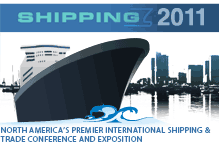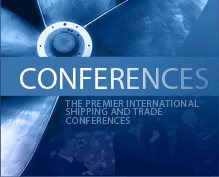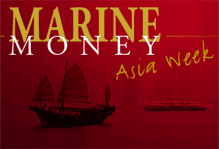
Recession: Learn to Enjoy It
2002 poses macro-economic questions on shipping more than any year since the Asian crisis or before that the global recession of 1991. One can come up with all the creative financing or the best niche trade in the world but without incorporating the global economic view in the calculations, there is really no way to be confident that one’s contingency plans, the worst case scenarios utilized in the financial calculation, are adequate to ensure survival in the face of crisis.
Of course not everything can be truly accounted for, just look at September 11th, Argentina and Enron. Yet the basics can be accounted for. So, while the risk profile is much different today than prior these events, if there are no catalysmic events this year, what are the “basics” today?
Tapping into U.S. Finance Companies
By Matt McCleery
As most Marine Money readers have probably noticed, there are no less than a half dozen American finance companies presently peering through the window at the ship finance industry and deciding whether or not they want to come inside. There are a few reasons for this. First off, the current low interest rate environment has caused the expensive margins historically offered by finance companies to become more appealing to shipowners. Second, finance companies like Boeing Capital, GATX and GE Capital that are heavily invested in aircraft view ships as another so-called big-ticket asset class through which they can diversify sector risk while still capitalizing on their structuring expertise.88For finance companies, making inroads into shipping will not be without challenges. During the last few years, shipping has suffered from too many lenders chasing too few corporate credits and the resultant low pricing will not be appealing to finance companies. That said, though, the trend is favorable for finance companies, which represent the middle ground between banks the capital markets. The contracting liquidity and rising prices we saw in 2001 may give finance companies an edge they haven’t had in the past. In addition, as we steam into depressed markets, the finance company specialty the sale/lease back will probably be appealing to owners who have identified attractive investment opportunities in which to deploy their “unlocked” equity. The same deals that are getting done in KG market could start getting done with US finance companies. Whether it’s cash strapped companies that wish to sell and leaseback in order to raise cash or owners looking to window dress their balance sheets, US finance companies may provide the “dry powder” necessary to empower owners to make superior investments.88In reality, though, sale/lease backs are easier said than done. Infinite OPA 90 risk, which extends to financial parties, make the ownership of tankers especially tricky.
While giants like BP offer OPA indemnification, smaller owners don’t. The problem is hardly limited to tankers, as even a bunker spill from handy size bulk carrier can rack-up enormous claims. There have been some examples of finance companies owning tankers, but they have been few and far between, often resulting from bankruptcy redeliveries. For the lawyers able to crack this riddle, the riches will be plenty.
OPTIONS FOR NEW BEGINNINGS
By Geoff Uttmark
Internet Resources:
www.optionanimation.com*
www.optionetics.com www
options.com
www.stockwalk.com
* The author is indebted to Jerry Marlow who provided a copy of his book Option Pricing: Black-Scholes Made Easy (John Wiley & Sons, Inc., New York, 2001) for this article.
Shipping magnates deal steel, bankers and brokers deal paper and vast sums of money are made and lost on correctly or incorrectly predicting the ever present but never constant shipping cycle. An inveterate “whale” said it best at Marine Money’s Ship Finance Forum – Hong Kong last November, “Where else do you get the volatility of shipping, ninety percent gearing and the forex play in a single pack- age?” Unquestionably, the glamour that attaches to shipping more stubbornly than barnacles to hulls is first in controlling the assets, seconded by control- ling the paper, but to the suave speaker’s rhetorical question reminiscent of a scene from The Graduate, the response is not “Plastics, my boy, plastics” but “Equity options, my boy, equity options.” In pure dollar terms, equity options may look like AA ball com- pared to the Major Leagues of globe-bounding bottoms buying, but in terms of potential return on investment, they are often the champions, depending on how they are used. As our planet’s original global industry continues to evolve towards larger shipping groups in order to access public equity markets, exchange traded equity options effectively offer punters a third way to play the shipping markets.
Originally, one needed to ante a ship to sit at the ship- ping cycle poker table. Then came shares in shipping companies, a liberalizing exercise for both owners and investors. Now come options on the shares in shipping companies – high- ly leveraged derivative instruments on the back of equities riding the shipping the market. It’s enough to enable smart pilot fish to swim circles around the whales.
Greek Ferries Lead the Way
By Geoff Uttmark
“The Greek climate, although it had great variety, rarely endured typhoons or very
strong gales. The temperature was always pleasant, blue skies, clear atmosphere, and
the sun almost a permanent source of light. Such an environment does make for a freer spirit,
strengthens the imagination and makes people optimistic, liberal and daring. In other words, it created the necessary conditions for the Greeks to become very good shipping men.”
The History of Greek Shipping
Spyros Polemis
Environment and geography may have played their part in nurturing Greek shipping throughout the ages, but it is instinct and acumen that have created the modern magnates. Some are legend and none are mythology. It is the penchant for risk-taking, and knowing when and where to take them, that has placed Greeks among the world’s most successful and respected ship owners.
Continue Reading
BP’s Call for Capital
By Matt McCleery
Oil major fleet replacement deals bring out the best, and worst, in ship finance. Giving financiers long bareboat charters backed by strong credits and OPA indemnification provided by oil majors that are unwilling to take a residual value risk or accept ‘put’ options is like letting kids play with matches. Since fine pricing is required to be competitive on these deals, what often results is aggressive structures that don’t amortize enough principal and produce unwieldy residual values at the end of the charters. As a result, it’s no surprise that oil major deals are often financed with capital from outside the shipping industry. Whether its bond deals like First International, Windsor Petroleum, California Petroleum and Golden State, or equity structures such as Nordic American Tankers and Knightsbridge, history has proven that experienced shipowners and ship financiers have steered wide of oil major fleet renewal.
Continue Reading
Container Ships, a Greek Opportunity?
By Kevin Oates
Just last year there was optimism that the large number of post-panamax size vessels on order and due to be delivered through to end 2002 could be absorbed into an expanding market without disturbing rates. It was known that all these vessels would be deployed on the major east – west trades being Europe to Far East, Transpacific and TransAtlantic. The reason for the optimism was because the container business had been growing and growing for a couple of decades. What could stop it? Projections for growth in world GDP were still at 2.5% to 3% and therefore the expected growth in container demand was expected to be some 9%. Those in the know use a rule of thumb which goes like this: growth in world trade normally outstrips growth in GDP by some 3% and growth in containerisation exceeds growth in world trade by another 3%. 3 + 3 + 3 is 9%. Quite simple really!
But unfortunately the rule of thumb calculation has defaulted. Or not so much the calculation; more the starting point. Much of the world is in recession and global GDP estimates are now hovering at about 1%. Container shipping is being hit hard. Freight rates have collapsed and vessel values are expected to follow.
Continue Reading
EDITOR: SEA OF OPPORTUNITY
When horror strikes an already ailing global economy as it did on September 11th, it is valid to be concerned about the well-being of one’s business, any business.
The US Federal reserve is trying to do everything it can to spur spending by lowering the Federal Funds rate by a full 1% in two actions since the terror. It has also lowered rates nine times since the beginning of this year. The US economy has still slowed throughout the year and while it grew, just barely, in the second quarter, it is likely to ‘go negative’ in Q3.
Continue Reading
Fred Cheng’s New Sun
By Matt McCleery
It’s Monday morning and Fred Cheng is in Vancouver finalizing a deal to “bareboat charter,” as he says, his house to Eddie Murphy who will spend the next five months filming a new movie in that photogenic city. Yesterday he was in New York, tomorrow he will be in Hong Kong and a few days later he will be back at his home base in Tokyo, sipping his trademark Coca-Cola and tweaking various charterback deals. That may sound like an unusually demanding schedule to you, but it isn’t for Mr. Cheng. Having dusted himself off after being thrown from Golden Ocean, the company he spent almost three decades building, one of shipping’s most experience dealmakers is back in the saddle again.
Having shaking off the morass of lawyers and vulture investors, the affable deal architect is back to doing what he does best: designing and building shipping transactions with first class charterers and financiers. As we go to press, Marine Money believes his new company Shinyo International (Japanese for “New Sun”) has inked a sale/charterback of a three-year old handysize bulk carrier to Louis Dreyfus in a deal banked by Nedship. We also think he has a few other deals on subjects. Backed by a coterie of devoted equity investors, bankers, shipmanagers and charterers, Mr. Cheng is once again practicing the art of fine tuning risk and reward, and creating deals that are attractive to everyone involved.
Continue Reading
FRONTLINE/SCOTIA SHARE SWAP BENEFITS
By Urs M. Dür
On September 24th, Frontline (NYSE: FRO) established an “equity swap line” with The Bank of Nova Scotia (Scotia) for the bank to acquire up to 3.5m of Frontline shares over the next twelve months. The programme is structured so that Scotia can ‘put’ the shares to FRO ‘at cost’ over the 12 month period. Scotia will also receive compensation for carrying the shares plus a margin equaling 4% of the transaction. Frontline can also ‘call’ the shares from Scotia ‘at cost’ at any time. We expect Scotia is under some mandate to buy the shares somewhat swiftly.
Under the programme, the shares purchased by the bank will be owned by the bank and will not be subject to immediate cancellation as if they were bought directly by FRO. This programme is considered part of the 7.5m FRO board-approved share buy-back programme (about 10% of the shares outstanding) which has been going on for some time.
Continue Reading
Great Circle Capital
By Matt McCleery
Equity: the mere mention of the word inspires certain members of the global shipping community to conjure images of languid summer nights on mega-yachts; mistresses with deepwater suntans sitting around negative edge swimming pools on French speaking islands and wasted days at Harry’s Bar at the Sherry Netherland Hotel in New York. Equity, in a word, is perceived by many to be the difference between players and pikers.
In reality, though, raising and investing equity involves more work, and greater stamina, than most people are capable of. Those investing equity must be vigilant since this ostensible elixir has the weakest position in the capital structure and evaporates when a deal goes anything less than brilliantly. Raising equity for shipping is also deadly-difficult for precisely the same reason – it’s like swimming upstream in an industry with lousy returns. Continue Reading







